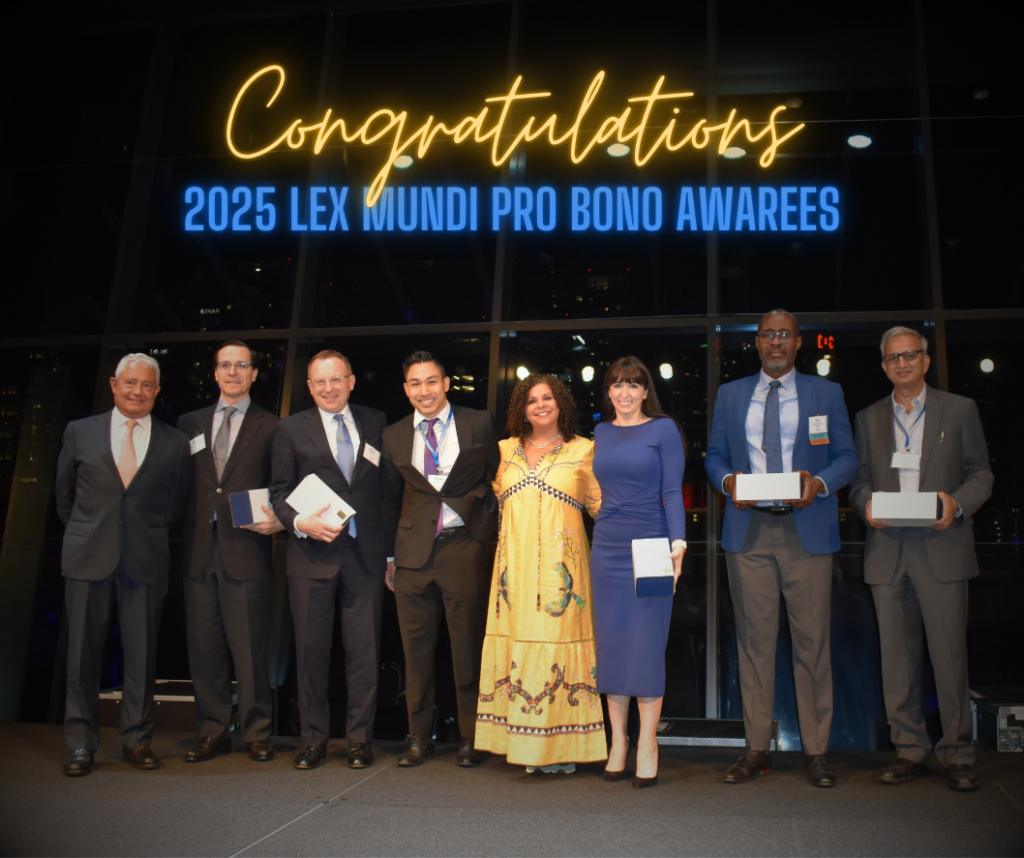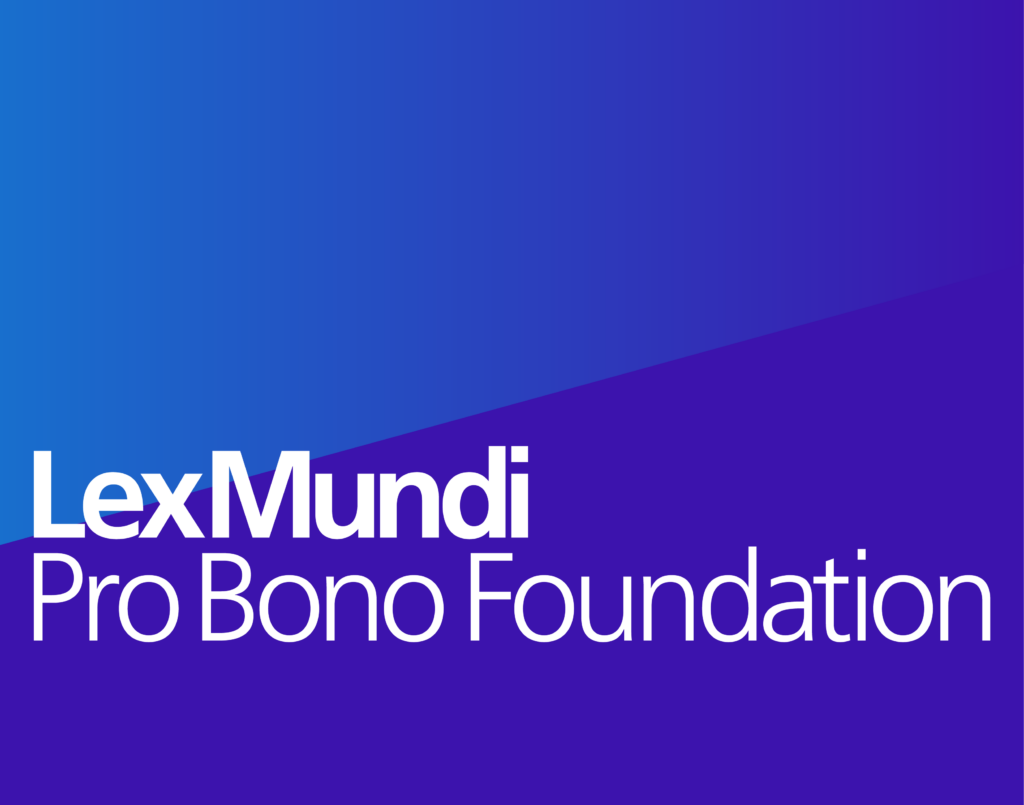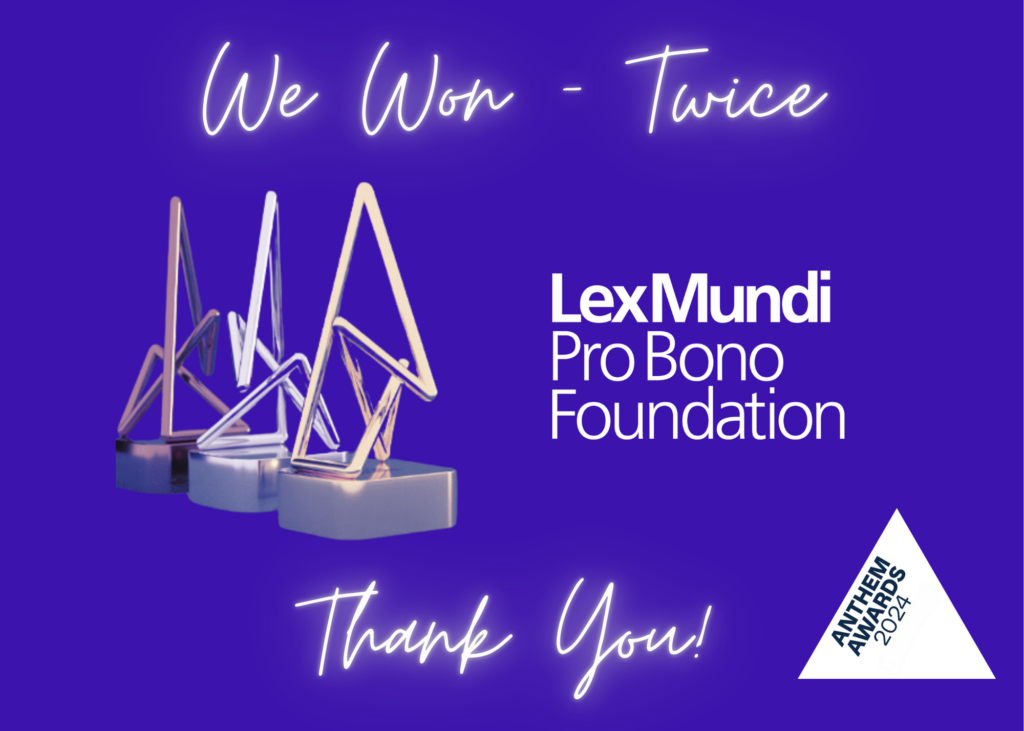2017 Lex Mundi Pro Bono Foundation Year in Review:
44 Lex Mundi Members Support 79 Social Entrepreneurs on 105 Matters
With 2018 already off to a great start, the Lex Mundi Pro Bono Foundation would like to thank the 44 Lex Mundi member firms that provided pro bono assistance to 79 social entrepreneurs on 105 unique matters in 2017. Since inception, the Foundation has connected 94 Lex Mundi member firms with more than 600 social entrepreneurs on more than 1,300 unique matters in 64 countries across the globe! The Foundation is grateful for the consistent, high-quality, critical pro bono legal support that Lex Mundi member firms provide to the world’s leading social entrepreneurs each day and for the firms’ generous support of the Foundation, our work and our mission.
As impressive as these numbers are, they are just a small part of the overall pro bono commitments of the Lex Mundi network. According to the most recent annual Lex Mundi Member Firm Survey, the Lex Mundi network collectively provided more than 550,000 hours of pro bono work with a total approximate value of nearly $200 million USD! This represents an incredible contribution and commitment to improving lives and communities around the world!
The following stories are powerful illustrations of the unique impact the Lex Mundi network has in support of social entrepreneurs globally through the Lex Mundi Pro Bono Foundation.
18 Lex Mundi Member Firms Support the Convergence Investment Platform in 21 Countries Around the World

In January 2016, Convergence launched the first and only platform that helps public and private investors find and connect with each other to co-invest in blended finance deals in emerging and frontier markets. Through its platform, Convergence has worked to enable more investment in these markets by leveraging public and philanthropic funding to unlock billions of private sector dollars for global development. By allowing investors to quickly search databases for credible deals or co-investors that match their investment needs, Convergence seeks to broaden investors’ networks and simplify their screening process. You can read more about their innovative approach and rapid growth in this recent case study by the Global Development Incubator.
 Through the Lex Mundi Pro Bono Foundation, 18 Lex Mundi member firms have played a critical role in enabling Convergence’s development. Over the past several months, these 18 firms in jurisdictions around the world have assisted Convergence to form charitable entities in Canada, the U.S., and the U.K., and, have provided in-depth advice on local security registration requirements for Convergence’s investment platform. Through Lex Mundi, Convergence was able to secure assistance in countries spanning all major regions of the world.
Through the Lex Mundi Pro Bono Foundation, 18 Lex Mundi member firms have played a critical role in enabling Convergence’s development. Over the past several months, these 18 firms in jurisdictions around the world have assisted Convergence to form charitable entities in Canada, the U.S., and the U.K., and, have provided in-depth advice on local security registration requirements for Convergence’s investment platform. Through Lex Mundi, Convergence was able to secure assistance in countries spanning all major regions of the world.
The collaboration with Convergence clearly shows the power and breadth of the Lex Mundi network. Convergence’s CEO, Joan Larrea, has been quick to recognize the importance of the partnership stating: “We owe so much to the Lex Mundi Pro Bono Foundation for the deep support from a number of your talented member firms over quite a long period. We could not have gotten to our launch date without your backing. We remain so impressed with Lex Mundi!”
Thank you to participating member firms: Blake, Cassels & Graydon LLP (Canada), Morrison & Foerster LLP (U.S., UK, Hong Kong, China), Brigard & Urrutia (Colombia), Bowmans (Kenya), Udo Udoma & Belo-Osagie (Nigeria), Liedekerke Wolters Waelbroeck Kirkpatrick (Belgium), Arendt & Medernach (Luxumbourg), Nishimura & Asahi (Japan), Clayton Utz (Australia), Uria Menendez (Spain), Afridi & Angell (UAE), Basham, Ringe y Correa, S.C. (Mexico), Rajah & Tann LLP (Singapore), Demarest Advogados (Brazil), Kromann Reumert (Denmark), Roschier, Attorneys Ltd.(Finland), Advokatfirman Vinge KB (Sweden)
6 Lex Mundi Member Firms Provide Comparative Regulatory Analysis for Rainforest Conservation in Latin America and the Caribbean
Late in 2017, the Lex Mundi Pro Bono Foundation partnered with Lex Mundi member firm for Mexico, Basham, Ringe y Correa, and the International Senior Lawyers Project (ISLP) to assist Derecho, Ambiente y Recursos Naturales (DAR) in an effort to carry out a comparative analysis of environmental regulations In Latin America. ISLP approached Lex Mundi seeking support from law firms in six countries for the project (in addition to three other, non-Lex Mundi member firms).
 Basham, Ringe y Correa (Mexico), GUFA Law (Honduras), Alvaradoy Asociados (Nicaragua), C.R. & F. Rojas (Bolivia), Perez Bustamante & Ponce (Ecuador), and Demarest Advogados (Brazil) combined to provide DAR an overview of the environmental legislation of each of their jurisdictions for the project. The analysis will form the basis of a regional review of regulations on environmental management with the dual goal of proposing the adoption of regional best practices and improving the regulatory environment in Latin America, starting with Peru.
Basham, Ringe y Correa (Mexico), GUFA Law (Honduras), Alvaradoy Asociados (Nicaragua), C.R. & F. Rojas (Bolivia), Perez Bustamante & Ponce (Ecuador), and Demarest Advogados (Brazil) combined to provide DAR an overview of the environmental legislation of each of their jurisdictions for the project. The analysis will form the basis of a regional review of regulations on environmental management with the dual goal of proposing the adoption of regional best practices and improving the regulatory environment in Latin America, starting with Peru.
Without hesitation, Lex Mundi member firms joined the effort and were critical in its success. “Working with such a variety of local law firms on such an expansive project seemed challenging at first,” ISLP’s Program Director, Diana McGinley, said. “But, with the help of the Lex Mundi Pro Bono Foundation and the willingness of our volunteer law firms the project is exceeding our expectations and it has the potential to make a real impact in the environmental regulatory sector across Latin America.”
“When the ISLP/DAR project came knocking on Basham’s door, one of the biggest challenges for its ambitious objective was securing committed, high-level counsel in multiple jurisdictions,” added Basham’s Pro Bono Counsel, Julio Copo. “ISLP had been doing a very thorough job screening and reaching out to potential targets to invite them to be part of the project one by one, but this process was also very time consuming. The Lex Mundi Pro Bono Foundation was able to quickly provide the project with the necessary high-level counsel in multiple jurisdictions with Lex Mundi member firms readily taking on the project. In the end, it was the Lex Mundi member firms’ participation that made the DAR project a reality.”




 Through the Lex Mundi Pro Bono Foundation, 18 Lex Mundi member firms have played a critical role in enabling Convergence’s development. Over the past several months, these 18 firms in jurisdictions around the world have assisted Convergence to form charitable entities in Canada, the U.S., and the U.K., and, have provided in-depth advice on local security registration requirements for Convergence’s investment platform. Through Lex Mundi, Convergence was able to secure assistance in countries spanning all major regions of the world.
Through the Lex Mundi Pro Bono Foundation, 18 Lex Mundi member firms have played a critical role in enabling Convergence’s development. Over the past several months, these 18 firms in jurisdictions around the world have assisted Convergence to form charitable entities in Canada, the U.S., and the U.K., and, have provided in-depth advice on local security registration requirements for Convergence’s investment platform. Through Lex Mundi, Convergence was able to secure assistance in countries spanning all major regions of the world.


